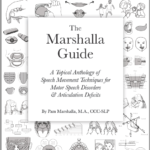Survey Says……..(with comments)

Thank you to the Speech Language Pathologists who participated in this speech and language assessment survey. I received responses from 9 people. Granted that isn’t a large number but I’ve read scholarly papers written with less data. I’m using the acronyms in this report since we all know what they are:). Sorry about the comments but I couldn’t help myself. It is my survey so I can do that. Please feel free to share your comments and questions.
What is your standard test battery?
The CELF-4 was the overwhelming test of choice for most therapists. The CASL and the OWLS were most frequently mentioned as second choices. For vocabulary testing most preferred the PPVT/EVT combo to the ROWPVT/EOWPVT. Then there is the good old Goldman Fristoe. What else could you use for articulation? It’s quick, it’s familiar. It’s old but really articulation is the one thing that hasn’t changed.
The tests mentioned for assessing higher order language included the TLC and the TAPS-cohesion subtests. The TOLD and PLS were mentioned for younger students.
What supplementary testing do you use for more involved children or for specific information?
- TOPS
- Parts of the CASL
- CTOPP
- LPT
- TOPL
- Social Language Development Test
- Listening Comprehension
- SSI
- SPELT
- Brigance
I can say that I am familiar with almost all the supplementary testing mentioned on the survey and use several. I prefer the test of problem solving to the TOPL because of the breakdown into skill areas. However, I’ve only read the TOPL not given it. I have the CASL available but just can’t bring myself to take the time to learn something new. I usually fight with the reading specialists on who will give the CTOPP. If you’re smart you’ll let them win. I purchased the Listening Comprehension Test but have yet to use it. I recently viewed a old and copied version of the SSI. Didn’t use it but did use a similar process to gather data. I actually found a great stuttering resource on the State of Tennessee site http://www.state.tn.us/education/speced/doc/71309SLIfluency.pdf Never heard of the The Structured Photographic Expressive Language Test (SPELT) but it sounds interesting and quick to give.
No one mentioned using Test of Written Language, but I read it in reports all the time. Next survey will include that as a question. I personally don’t work with kids enough hours a week to make an impact with their written language, too much follow up is needed to teach the editing process correctly. Plus I feel you have to be able to organize your language orally before there is going to be any significant improvement with writing. Just and opinion.
What drives your test choices?
Most respondents felt that their experience was the main factor when choosing tests to give. A small percentage of the respondents also felt that test availablity, time, administration and curriculum also drove their choices.
Does your school provide up to date testing materials?
Over half of the respondents said that their school does not provide up to date materials. We all know this is a big mistake on the school systems part. I know from personal experience that some school administrators see the importance of this and some don’t. Your testing could be judged invalid if you don’t have up to date or the right materials. Parents are smart these days and don’t hesitate to request an outside evaluation if they don’t feel the assessment at schools is an appropriate one.
Does your school copy protocol sheets?
Approximately 3/4 of the respondents said that sometimes they have to copy protocols and 1/4 said they always have to copy. We all know it happens and it is understandable that you might run out once in awhile. I’ve worked in a few systems where copying was the norm rather than the exception. I don’t know the law but I am assuming copying protocols must violate some copyright law. However, I also know that the protocols I use go into a personal file when testing is over rather than the students file at school.
The other problem with copying is that it makes testing more difficult and time consuming. Often the correct responses are color coded to make life easier. I won’t give up that luxury anymore. During an interview I asked about testing material and protocols. The blatantly told me they copy all their protocols. I blatantly told them (but nicely) that I wouldn’t use copied protocols. We’ll I didn’t want the job anyway.
Do you feel your given enough time to give and produce comprehensive and detailed evaluations?
Not surprisingly the overwhelming response here was a big NO. People not only end up with no writing time, many respondents said that schools also make it challenging to find time to do the actual testing.
How long do you spend testing a student?
Granted this greatly depends on age and specific needs. Respondents specified anywhere from 2-4 sessions ranging from 30-60 minutes a session.
How long do your write ups take?
Write ups take anywhere from 1-6 hours. I should have added a clarifying question on survey. How long is your report? I know my evaluations are usually 6-8 pages in length but much of that is the standard template. One respondent mentioned a short evaluation sheet that they fill out. Length doesn’t necessarily mean quality so I would like to see a shorter form. Maybe even consider using it.
It is clear that expectations for write ups must vary from school to school. I would bet vary from type of community to type of community is more like it. Who your writing for and how much written analysis you have to do shouldn’t but might dictate how thorough you are. I try very hard to do the same for everyone.
Do you have testing time and writing time in your schedule or do you cancel students to get testing done?
Almost 3/4 of the respondents said they had to cancel students to get testing done. Glad to hear I’m not the only one who has had to do that over the years. It’s not the rule but it happens more often than one might think. I hate it and feel extremely guilty because a student had to miss out. Rule of thumb always let the administration know that you have/had to cancel students to get testing done to meet deadline….in writing. they need to know the situation and they need to take responsibility for it.
How many evaluations do you do in a year?
The average seems to be around 30 with a range of 15-40. I know this number can be so random based on caseload size, three year re-evaluation schedules, teacher referrals and parent requests. One year you may have 30 to do and the next year 15. If you have a caseload of 60+ you are doing a lot more. This year I am doing just testing at one of my schools which means I will easily clear, probably 40 evaluations this year.
Do you feel confident and competent when testing and analyzing data?
Almost 3/4 of the respondents said they felt confident with their assessment skills. The other 1/4 said they feel confident most of the time. That’s actually not a bad thing because I feel that leaves you more open minded and willing to learn from others.
Does your testing usually line up with the academic and psychological testing?
Almost 100% of the respondents said yes. I love it when that happens. The team looks so professional.
Feelings about testing
Most therapists preferred to do their own testing because it helps them analyze skills, write goals and plan therapy. Only about 1/8 of the respondents secretly wished that students went out for testing. If I had to guess those feelings are probably related to the report write up rather than doing the actual testing. Only one respondent said they did not like testing. Personally I’d rather write up a evaluation report than a progress report any day.
The report itself
Over 3/4 of the therapists reported using a template or series of templates to make report writing easier. Almost all reported that their reports provided descriptions of the test and what they measure.
The procedure and expectations for making recommendations varied greatly. Some make general recommendations in their report and specific ones at the meeting. Some are required to make recommendations and were cited when they didn’t. I am working in a couple of different systems this year and find that different schools do want it done differently. It guess just depends on who is interpreting the rules and laws. I’d love to find out more about this.
Do Speech Language Pathologists in your district meet on a regular basis and consult?
Most of the respondents stated that they do get together with other therapists in their district. However, not always on a regular basis and with very few relevant common goals in mind. I know that is often administration driven and they tell you what they want you to work on.
Almost all respondents said that they have other therapists in their district that they could consult with. One respondent mentioned approximate 30 SLPs in her district and they felt this was their greatest strength. I would love to know if systems that big have any more power around appropriate caseload/workload, more time for paperwork duties (because of the large numbers or workload) and other issues that only concern SLP’s.
Do you feel teachers value the information you give them and use it in their programming?
Therapists were split about 50/50 on this. Some teachers use the information we provide, some just want the kids identified and one mentioned rarely seeing a teacher take a note during team meetings. I’ve worked in school systems where the teachers present then leave while the rest of us discuss the meat and potatoes of the evaluations and programming. I think they have it wrong. Teachers need to hear what we have to say and learn from us like we learn from them. I think it comes down to our identity in the schools system and few understanding our knowledge and expertise.
Conclusions
Everyone uses a similar battery of tests. The time factor is still an enigma to me. Some take a lot of time to complete testing and some don’t or can’t. I think it is hard to thoroughly judge this since the end products cannot be compared. Perhaps that is a study for another time, “report write ups.” I would like to know if I could do things better and quicker.
Seems like we’re all almost on the same page and we face the same challenges. There is never enough time in our day to complete even the most critical work. Schools don’t seem to understand that when our work is lacking because of time constraints the whole program looks sloppy and unprofessional. I’ve sat in very professional meetings and meetings that were run very inefficiently. There is a difference and some parents do know. I would bet that systems who are constantly battling with parents and/or sending kids out for evaluations, are systems where everything is done on the fly.
This was a fun survey to do and it raised all kinds of questions in my mind. Hopefully I will get to follow up on this in the very near future.







